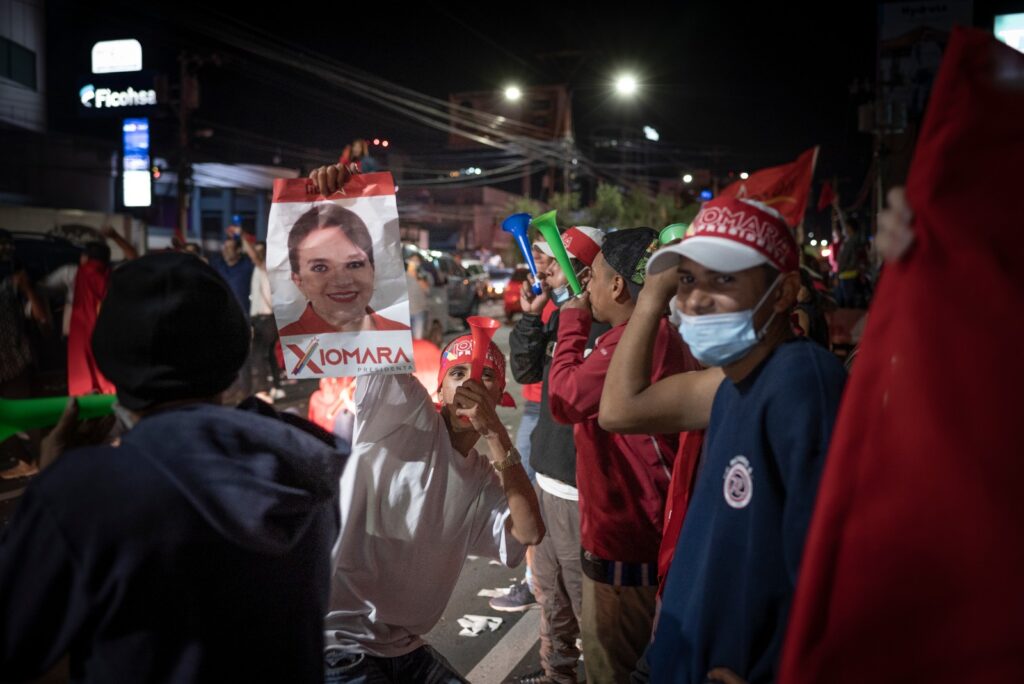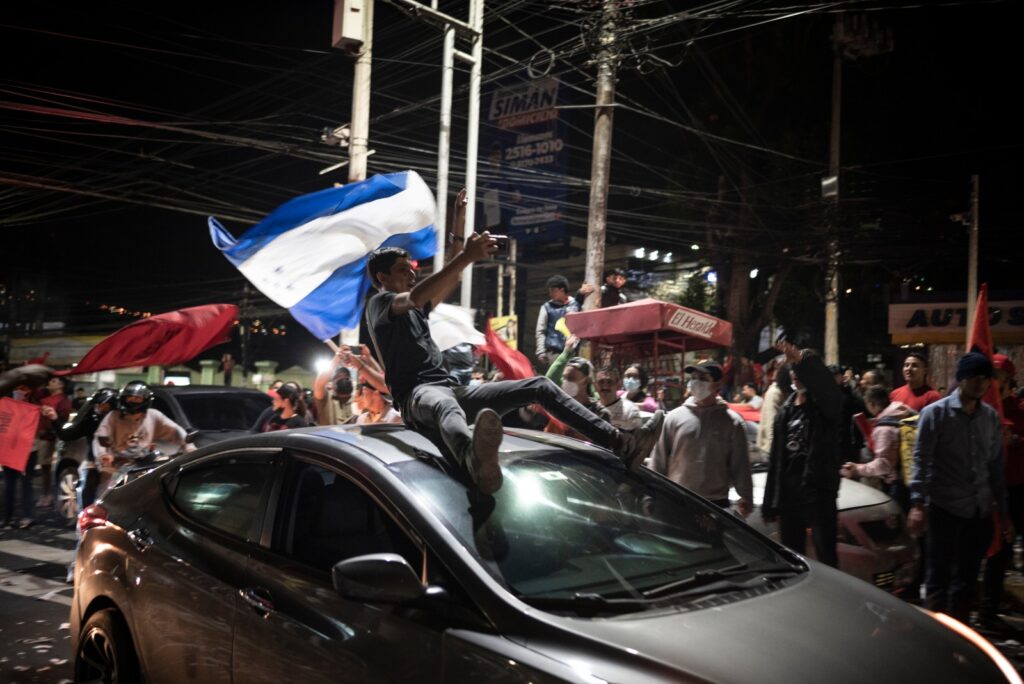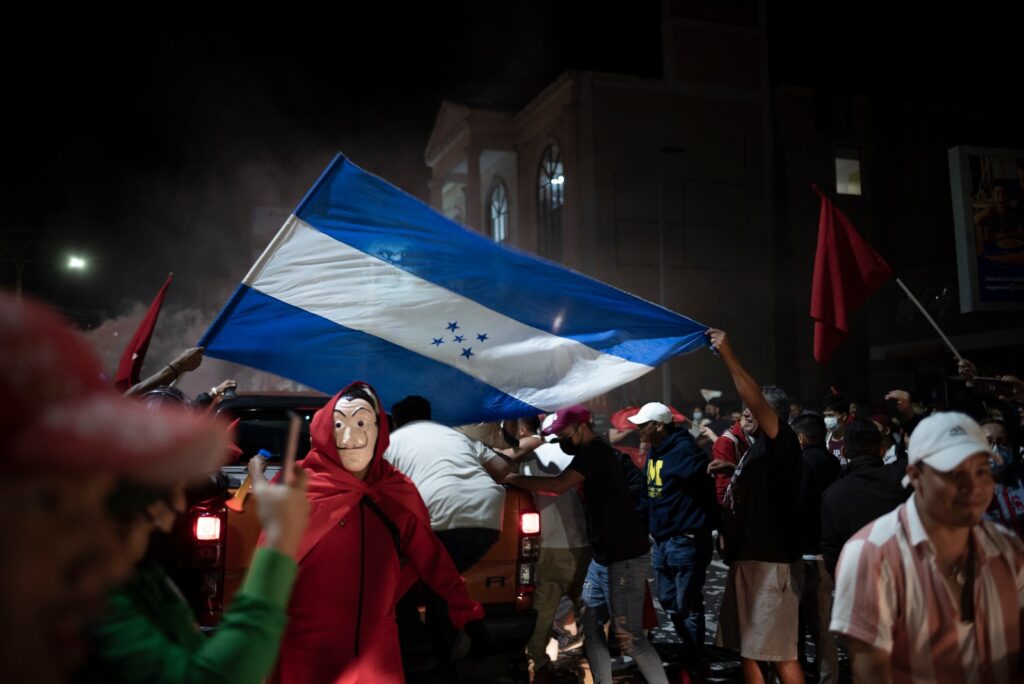
Por Pamela Cruz. Península 360 Press [P360P]
Tegucigalpa, Honduras. – ¡Xiomara! ¡Xiomara! ¡Xiomara! se escuchaba una y otra vez entre bocinas de autos, gritos, abrazos, y música. La noche y madrugada de este lunes, las calles de diversas ciudades y departamentos de Honduras se pintaron de rojo, una marea roja incontenible que daba cuenta de que, tras una larga jornada electoral, los resultados preliminares apuntan que el país tendrá a su primera presidenta en la historia.
Y es que, al parecer, la tercera es la vencida. De acuerdo con datos del Consejo Nacional Electoral de Honduras (CNE), el 51.45 por ciento de las actas han sido computadas, y la candidata presidencial del Partido Libertad y Refundación (LIBRE), Xiomara Castro, lleva la delantera con 53.61 por ciento de los votos.

Con casi 20 puntos atrás, le sigue el candidato del Partido Nacional de Honduras, Nasry Juan Asfura Zablah «Papi», quien, con todo y el apoyo desde el gobierno actual, no ha podido alcanzar a la candidata de la izquierda y tan solo cuenta con 33.87 por ciento de los votos.
Xiomara Castro ha arrasado en las casillas de votación que se instalaron en todo el país, lo cual da cuenta del hartazgo de la población por el partido Nacional y un candidato que le daría permanencia a un proyecto que ha permeado al país tras el Golpe de Estado de 2009.
El CNE ha detallado que, se habilitó a 5 millones 182 mil 425 electores para votar, de los cuales hubo una participación del 68.9 por ciento.
¿Quién es Xiomara Castro?
La virtual presidenta de Honduras es oriunda de la capital del país, Tegucigalpa, donde nació el 30 de septiembre de 1959, y comenzó su carrera política al encabezar protestas en las calles para que su marido, Manuel Zelaya, fuera restituido en el poder, tras ser derrocado el 28 de junio de 2009.
Sin embargo, Xiomara cuenta con una carrera como administradora de empresas, tiene 4 hijos, 5 nietos, y 44 años de matrimonio con Manuel «Mel» Zelaya.
Xiomara perteneció al conservador Partido Liberal, bajo cuya bandera su esposo fue presidente de Honduras ‒2006-2009‒ y ella primera dama de la nación. Sin embargo, tras el derrocamiento de su esposo, Castro cobró más fuerza y seguidores, lo que la hizo convertirse en la candidata presidencial del recién fundado Partido LIBRE ‒2011‒, para las elecciones generales de noviembre de 2013.
En ese, su primer intento no logró su cometido: perdió ante el candidato conservador del Partido Nacional, Juan Orlando Hernández. En 2017 lo volvió a intentar bajo la misma bandera del partido LIBRE, pero nuevamente perdió, contra el mismo candidato, quien fue reelecto en unas votaciones que han sido tachadas nacional e internacionalmente como fraudulentas.
Juan Orlando Hernández tendrá que ceder el 27 de enero de 2022 la silla presidencial a Xiomara Castro, la primera mujer que será presidenta en la historia del país, una cuyo partido es de izquierda y que busca cambiar, a toda costa, «el sistema obsoleto y agotado que nos oprime», dijo en su plan de Gobierno.
Para los comicios de 2021 Castro se presentó con la oferta de la “construcción” de un “Estado socialista y democrático”, resaltando “la protección de los derechos del pueblo soberano y la naturaleza”, según su plan de Gobierno.
El primero de los tres designados ‒vicepresidentes‒ de Xiomara Castro es Salvador Alejandro Cesar Nasralla Salum, con quien realizó la Alianza de Oposición contra la Dictadura que tras fracasar y entrar en confrontaciones volvió a unirse, con la diferencia de que, en esta ocasión, fue Nasralla quien cedió su candidatura por el Partido Salvador de Honduras.
Los otros dos designados de Castro son: Doris Alejandrina Gutiérrez, abogada, política hondureña, y el médico Renato Florentino Pineda.
El panorama para Xiomara
La virtual victoria de Castro fue muestra de la frustración y hartazgo de los hondureños con la pobreza generalizada, el crimen, la violencia, la corrupción en todos los niveles de gobierno y la continua incapacidad de los líderes electos para abordar dichas problemáticas.

Cabe recordar que, en 2019, 48 por ciento de los hondureños estaban por debajo de la línea de pobreza, mientras que 70 por ciento estaban subempleados.
La situación se ha recrudecido en los últimos dos años, pues las dificultades de los hondureños se han visto agravadas por los efectos de la pandemia de COVID-19 y los huracanes Eta e Iota.
Dichos fenómenos naturales golpearon duramente al país en noviembre de 2020, ocasionando daños por 1.9 mil millones de dólares, y afectando a cuatro millones de hondureños. Así, la mezcla de estas dos situaciones, hizo que la economía de Honduras se contrajera un 9.0 por ciento en 2020.
Problemáticas como la delincuencia y la inseguridad son temas que sin duda deberán enfrentarse a la llegada a la silla presidencial. Las tasas de homicidios en Honduras durante 2020, pese a que mejoró respecto a 2019, fue de 37.6 asesinatos por cada 100 mil habitantes, una de las más altas de la región.
La corrupción y el narcotráfico también han inundado al poder, pues el actual presidente de la nación, Juan Orlando Hernández, ha sido nombrado públicamente como co-conspirador en un caso de narcotráfico en un tribunal de EE. UU., que resultó en la condena de su hermano Tony Hernandez.
Además, el predecesor del presidente Hernández, Pepe Lobo, la esposa e hijo del expresidente, así como el actual candidato presidencial Yani Rosenthal, han sido todos condenados o acusados de manera creíble de vínculos con el narcotráfico o el lavado de dinero.
Te puede interesar: En marcha las elecciones generales en Honduras

